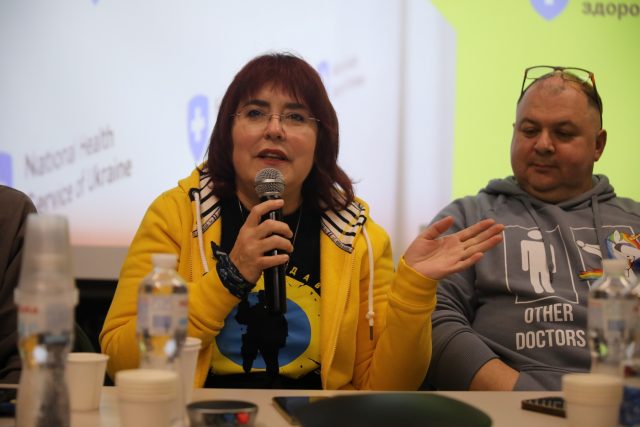How does noise affect health and can it shorten life expectancy?
by Victoria Milyutina, director of the Northern Interregional Department of the National Health Service of Ukraine
October 18, 2024, the VII Kharkiv Security Forum “Civilian Ukrainians: Challenges and Resilience in the Conditions of Terrorist War” was held in Kharkiv. The forum was organized by the Maidan Monitoring Information Center and the Konrad Adenauer Foundation with the support of the Humanitarian Coordination Center.
The forum expert speeches are published here.
A 2011 World Health Organization study indicated that overall noise exposure reduces lifespan by 10-12 years. To put this into perspective, smoking, on average, shortens life expectancy by 6-8 years.
Let’s think about the noise from the point of view of physiology, from the point of view of our normal life before missile attacks. Typical noise levels fall between 30 and 80 decibels (dB). Noise exceeding 85 dB negatively impacts our psychological, physical, and emotional well-being.
If we walk in the forest, the noise level is about 30 dB. And if you hear a jet plane taking off, if you are in a stadium at the football championship final, or at a rock star concert, the noise there is about 130 dB. This is already considered such a critical level that it already affects health. And if you are in such conditions for more than 30 minutes, then people may already feel unwell.
Noise also has a cumulative effect. Prolonged impact amplifies the response of our finely balanced organism. In the context of war, noise exceeding 130 dB is a significant impact that affects well-being. This level of noise has a serious effect, regardless of individual perception.
When we hear the sounds of explosions, we worry, there is a threat to our lives, a threat of destruction. These are other aspects of how we feel. And the impact is not only on our physiological state, but also on our psychological one.
These sounds always appear unexpectedly, when we don’t expect them. And we are in a state of uncertainty, vulnerability, because we don’t know when the explosion will start. Our nervous system is also tense. We produce stress hormones — adrenaline, noradrenaline, cortisol. Our blood pressure rises. It has been affecting you and me for a long time. It has affected me periodically since 2014. It has affected absolutely everyone, every citizen of Ukraine — since February 24, 2022.
Acoustic terror can cause post-traumatic stress disorder. And these consequences will require long-term psychological support. Why? Because our balance is disrupted.
Exposure to noise levels exceeding 130 dB can result in various adverse health effects on the human body. These include both temporary and permanent hearing loss, headaches, difficulties sleeping, elevated blood pressure, and an increased risk of heart problems.
Yesterday we held an international congress called “Mild Traumatic Brain Injury — Autograph of War.” This congress was a platform for military medics to communicate. Previously, we did not pay much attention to mild traumatic brain injuries, of which we have a lot. Experts ask us not to use words like “concussion” or “concussed.” We no longer call a person with a disability “disabled.” A person with a mild traumatic brain injury is not concussed. That’s such a negative context. But in any case, if you are at a certain distance from an explosion, you will definitely get this injury.
This mild traumatic brain injury can also be disguised as a hypertensive crisis. We talked about how to recognize it, how to recognize sleep disorders. For example, in the Azov, in the Third Assault Brigade, training for comrades is already underway. Of course, a soldier with such an injury will not go to the medical center himself. He needs to lie down, to sleep — but he will not go away. He should be on the front line, fighting. But there, doctors teach you to pay attention to signs of injury. The examples of such signs could be as follows: your comrade begins to sleep badly, or does not sleep, or takes unscheduled night shifts because he is still awake. Therefore, such things are also very important. We need to pay attention to this.
Also see her presentation (in Ukrainian)





